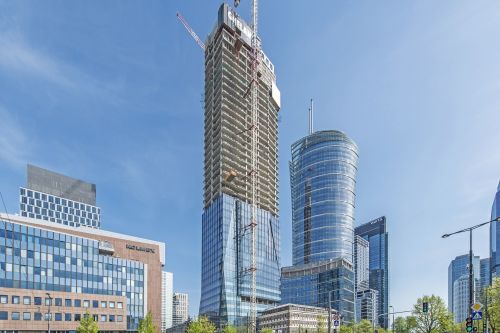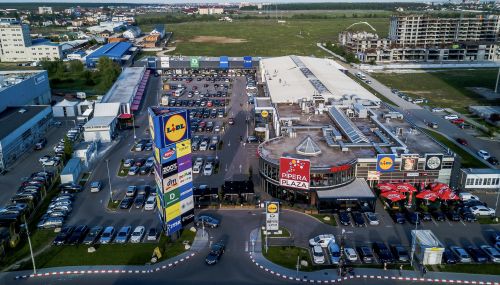When it all caves in
Retail & leisure
In August 2011, Hungarian developer TriGranit Development Corporation was granted a building permit for its Poznań City Center Integrated Transport Centre project. The investment was carried out as a public private partnership, with the developer’s partners being the Polish State Railways (PKP) and Europa Capital. The project involved combining a new shopping centre with a redevelopment of the city’s main bus and railway stations. In the first stage, the hall of the train and bus station was built, followed by the construction of the shopping centre. Since the outset the development had proceeded smoothly and without delays. The foundation stone was laid in January 2011. In May 2012, the work on the Poznań Główny railway station was completed and in August the modernisation of the bus station was finished. At the same time, construction work on the shopping centre continued. Investment costs for the three-storey building, which has a leasable area of 61,000 sqm and 230 shops, amounted to EUR 119 mln, with financing provided by Bank Zachodni WBK, Raiffeisen Bank Polska, Nordea Bank Polska, BRE Bank and Hypo Noe. The opening ceremony took place on October 25th, 2013. Exactly six months later the festive mood has completely evaporated. On the night of April 24th and 25th, 330 sqm of suspended ceiling on the second floor of Poznań City Center collapsed. The incident was so serious that the building could not be used for almost two weeks (customers could not be re-admitted to the centre until May 8th). TriGranit came under severe criticism due to the amount of negative publicity that was generated, as frustrated shoppers vented their frustration on the internet and in the local media. The retail sector has also taken a very dim view of the events, especially since the six-month-old building had been sold to another owner a month before the ceiling collapsed.
Difficult first steps
Poznań City Center has actually been plagued with problems from since its opening. Poznań residents have continued to complain about the pedestrian access within both stations. A few controversies of varying degrees of magnitude have also arisen online and in the local media. The disaster, when it came, proved to be the final straw. Paweł Łukaszewski, the District Building Supervision Inspector, gave an immediate reaction. “The collapse of the ceiling in Poznań City Center was directly caused by an overload of the suspended ceilings on the second floor of the building due to excessive dampness in the structure. That had been caused by a leaking roof and a leak in the fire system,” he explained on the ‘Jest Taka Sprawa’ programme broadcast on local radio station Merkury after an inspection of the scene. It should be emphasised, however, that a report still has to be published confirming this version of events. Both the developer of the building and its new owners have decided to refrain from making any comment until the report is published. “The investigation is in progress. We need to wait for its findings. For the time being, we cannot say what the cause of the collapse was or comment on the results of the inspection,” says Tomasz Lisiecki, the chief development officer of TriGranit Development. He rejects any accusations of haste during the development of the project. “The building, which doesn’t have any underground car parks, was developed over two years – I wouldn’t call that a crazy pace. The schedule was carefully planned, so we didn’t have to hurry to finish the construction of the mall on time,” he stresses.
After some of the repairs ordered by the Construction Supervisor Inspector were carried out, the building was able to re-open. Some tenants, however, couldn’t resume operations, because repairs to the ceiling were still taking place on the first and the ground floor. Due to the work in progress, there were delays to the re-opening of Smyk, Gadżeciak, Kinderplaneta, Automobilklub, Martes Sport, City Sport, BoboQ and Sports Direct. The section where the House, Cropp, CCC, Home & You, Reserved (on the second floor) and 4F stores are located will remain closed until further notice. “We are carrying out all the work ordered by the Construction Supervisor Inspector and the majority of the building can now operate as normal. Repairs to the collapsed section are still in progress. We estimate that we need 1.5 months to finish all the work and bring the entire building back to running as normal,” insists Norbert Fijałkowski, the director of PCC, on behalf of the manager and owner ECE Projektmanagement.
A question of trust
The affair has tarnished the image of the Hungarian developer. As the supervisor of the construction and employer of the subcontractors, the company is responsible for all the work that has been done. When a serious technical defect comes to light in such a new and high-profile centre, questions naturally arise over the quality of work performed during the construction. “The situation is difficult for all involved. As a developer, I am having to face an incident of this scale in one of our buildings for the first time. Before the opening, the building had undergone thorough quality checks, which lasted for a few weeks and were monitored by different services, such as the Voivodship Construction Supervision Inspector, the fire brigade and the Poznań Sanitary and Epidemiological Station. The building was operational, and all the systems worked both before the opening of the centre and during our six-month management of the building. Poznań City Center is a very important investment for us. We hired more supervisors than on any other construction site. Moreover, the project was under the constant scrutiny of the banking inspector, who did not find any defects,” recounts Tomasz Lisiecki. He claims that the company is not trying to avoid accepting the responsibility for what has happened. “We apply tried and tested procedures and hire people and companies who have never failed us before. We are doing everything to get to the bottom of the matter and find an explanation for the collapse. We are cooperating closely with the present owner of the building to identify the cause of the problem,” insists Tomasz Lisiecki. The situation is awkward because two months before the collapse the centre changed hands. It was bought from TriGranit by funds managed by ECE Projektmanagement (the Prime European Shopping Centre Fund) and Resolution Property (the Resolution Real Estate Fund IV). “Poznań City Center is an exceptional project. We have no reason to be ashamed of it. If it wasn’t a good investment, two funds, including one of the biggest management companies in Europe, wouldn’t have bought the mall. Besides, the new owners have performed thorough due diligence. Poznań City Center has become a fixture on the city’s retail map and has been generating excellent results in terms of footfall. In the first month since its opening, it was visited by over a million people. The centre will become stable sooner than other projects of this kind,” argues Tomasz Lisiecki. He adds that a well executed construction project has always been and always will be the company’s priority – especially given that they are planning to stay active in Poznań for some time. In the second phase of Poznań City Center Integrated Transport Centre, they are planning to develop a mixed-use complex in parts of the railway station that have yet to be modernised. A two- or three-star hotel and two office buildings are planned for this location. The design work for the project is currently in progress and the company is in negotiations with three hotel operators. They would like to start the construction work on the hotel and office project at the end of 2015, while platforms 4, 5 and 6 will also need to be connected by a footbridge.
Investors and tenants
Poznań City Center’s customers are understandably concerned by the fact that such events could take place in buildings visited daily by thousands of people, while retailers are questioning the quality of the contracts they have signed and the security mechanisms in place in the event of another serious technical defect. The findings of the District Construction Supervision Inspector’s report will have a crucial bearing on allaying or fuelling such anxieties. At the moment, it is impossible to say whether the defect was caused by the construction or by the maintenance work. One might be tempted, however, to take a look at the issue from a wider perspective. In theory, due diligence should prevent a potential investor from buying a building with a hidden defect, but does this work in practice? “It is very difficult to give a definite answer to this question. Naturally, technical due diligence is supposed to detect faults and technical defects. Is it possible, however, to identify every kind of defect when performing standard technical due diligence? This is a question for a technical expert. It is obvious that not all technical defects can be detected during the standard due diligence performed before an acquisition of property,” comments Agata Jurek-Zbrojska, a senior associate at Hogan Lovells. The liability of the seller is defined in a different way in sale and purchase agreements. In current property purchase agreements, non-performance or inadequate performance are arbitrarily defined. “The potential claims of the buyer are usually regulated by the sale agreement signed by the seller and the buyer. In such transactions the parties are released from responsibility for defects under the civil code and regulate the issue according to the seller’s responsibility based on the principle of risk for untrue, unreliable or false statements, or the agreement specifies special warranty conditions applicable in certain circumstances. It is becoming increasingly common in property sale contracts for the seller to be released entirely from liability for any defects in the building. In this case, the buyer may claim indemnity from the constructor on the basis of the warranty/guarantee specified in the agreement on the construction work. Naturally, the guarantee is transferred onto the buyer, as specified in the agreement. In turn, in a standard construction work agreement the constructor’s indemnity under the civil code is defined by stating what and how much the constructor is liable for. In newly-constructed buildings the situation could be better because the warranty will not have expired and usually the constructor is obliged under the construction work agreement to provide surety in the form of a quality guarantee or deposit. This security is transferred onto the buyer and this facilitates the enforcement of claims,” explains Agata Jurek-Zbrojska. A shopping centre operates on the basis of cooperation between the lessor and the tenants. When a serious incident occurs and the building cannot operate normally, the interest of the tenants becomes a priority. In Poznań City Center this involved a two-week shutdown of stores and an additional closure of shops operating in the area of the collapse (five in total). “The lease agreements we sign with each tenant determines what needs to be done in such situations. We act in accordance with the provisions of these agreements. Moreover, we are talking to every store owner to find a solution to the situation and keeping every tenant informed. We are constantly in touch with them and together we are trying to find a solution,” says Norbert Fijałkowski. We asked the tenants about the procedures in such cases. None of them, however, was willing to comment. There is no doubt that the cost of the ceiling collapse will be considerable in terms of compensation and repairs. “We don’t know the cost yet as we are still evaluating this issue,” adds the director of Poznań City Center.
Michał Sternicki, general manager, Aareal Bank AG, Polish division
The view from the bank
Aareal Bank AG is the agent and along with Pbb Deutsche Pfandbriefbank one of the two lenders who provided acquisition financing for Poznań City Center in March this year. Following the disbursement of the loan and a few months after the official opening of the project, a section of suspended ceiling collapsed and the shopping centre was temporary closed. The lending banks got together with the owners of the project – ECE Group European Prime Shopping Center Fund and Resolution Property – to discuss the consequences and the impact on the operation of the shopping centre, as well as ways to mitigate the business interruption for tenants and inconvenience for shoppers and rail travellers. The operational experience of the centre’s owners and managers proved to be essential in dealing with the incident – whether it concerned relations with tenants, customers or the authorities. As a result the centre was re-opened in two weeks, which we consider to be quick, bearing in mind the initial scale of the problem.





















































